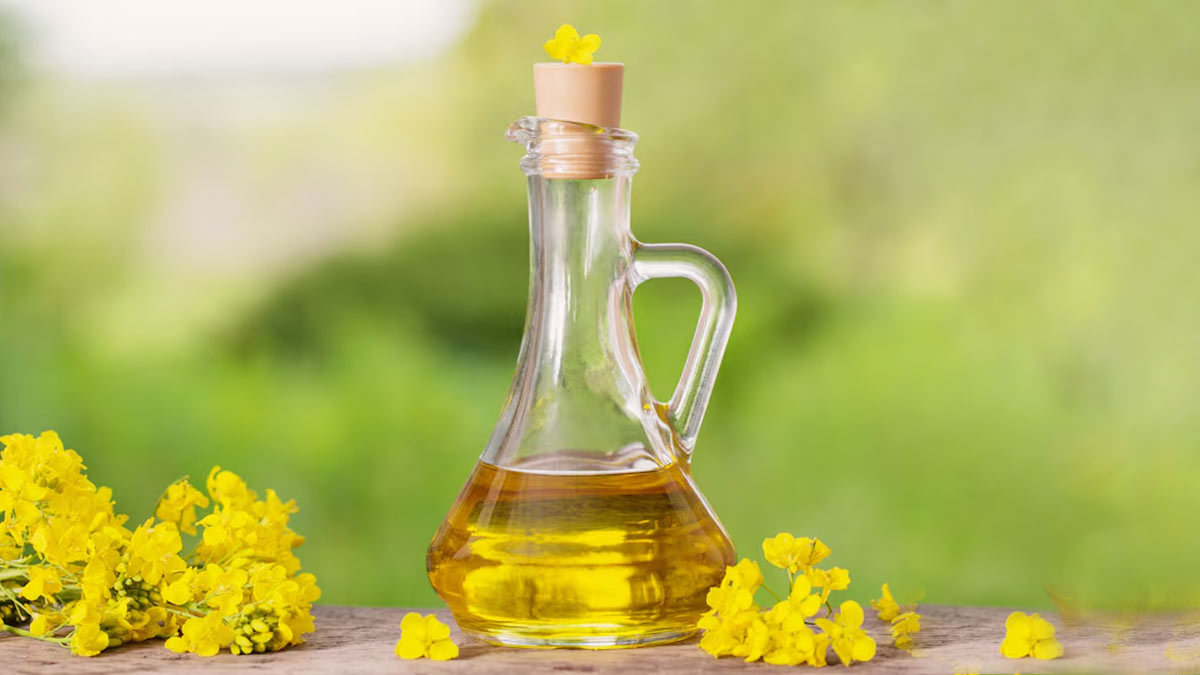
Mustard oil is quite common in Indian Households. It adds extra flavour to south asian and mediterranean diet. Do you know that mustard oil is banned for use as oil in the United States, Canada and Europe? According to the US Food and Drug Administration, mustard oil is used for external purposes only. Let's explore the health benefits of Mustard oil and why it is banned in western countries.
Table of Content:-
Why Mustard Oil Is Banned In US
According to the National Library of Medicine Mustard oil is a liquid oil with low saturated fat content that is popular in South Asia. It has a high proportion of erucic acid, a fatty acid linked to cardiac lipidosis in rats not in men. These findings persuaded the United States Food and Drug Administration (FDA) to prohibit the use of mustard oil for cooking.

Also read: Choosing Healthy Oil: Benefits And Uses Of Mustard Oil
Improves Heart Health
“Mustard oil is rich in monounsaturated and polyunsaturated fats, which are considered heart-healthy fats. These fats can help reduce bad cholesterol levels (LDL cholesterol) and increase good cholesterol levels (HDL cholesterol), contributing to cardiovascular health,” said Dr Ganesh Chaudhary, Bachelor of Ayurvedic Medicine and Surgery, PHC, Darbhanga.
Rich in Antioxidants
“Mustard oil contains antioxidants, including vitamin E, which can help protect the body's cells from damage caused by free radicals. Antioxidants play a role in reducing inflammation and supporting overall health,” said Dr Chaudhary.
Anti-Inflammatory Properties
Mustard oil is known for its anti-inflammatory properties. It contains compounds like omega-3 fatty acids and selenium, which may help reduce inflammation in the body.
Good for Skin and Hair
Mustard oil is often used topically for skin and hair care. It can moisturise the skin, reduce inflammation, and promote hair health. However, it's important to conduct a patch test before using it on the skin to avoid potential allergic reactions.
Considerations and Potential Concerns
Erucic Acid Content
One of the primary concerns associated with mustard oil is its erucic acid content. Erucic acid is a fatty acid that, in high amounts, may be harmful to human health. However, many commercially available mustard oils are now processed to reduce erucic acid levels, making them safer for consumption.
Also read: Mustard Seeds: Health Benefits, Side Effects And Nutritional Facts
Allergies and Sensitivities
Some individuals may be allergic to mustard or sensitive to mustard oil. It's important to be aware of any allergic reactions and consult with a healthcare professional if you experience adverse effects.

Moderation is Key
Like any cooking oil, using mustard oil in moderation is crucial. Excessive consumption of any oil can contribute to an unhealthy diet, as oils are high in calories. It's essential to balance your overall fat intake from various sources.
Not Suitable for High-Temperature Cooking
Mustard oil has a low smoke point compared to some other cooking oils, which means it may not be suitable for high-temperature cooking methods. Using it for frying or deep frying is not recommended due to the risk of producing harmful compounds at high temperatures.
Mustard oil can be a nutritious addition to a well-balanced diet when taken in moderation. It has possible cardiovascular advantages and antioxidants that promote general health. People with specific health ailments or concerns, on the other hand, should get customised counsel from their doctor. Also, selecting processed mustard oil with lower erucic acid levels helps alleviate some of the potential health risks connected with this oil.
Also watch this video
Read Next
Salt Cravings Can Be A Sign Of Underlying Medical Conditions: Here’s What An Expert Has To Say
How we keep this article up to date:
We work with experts and keep a close eye on the latest in health and wellness. Whenever there is a new research or helpful information, we update our articles with accurate and useful advice.
Current Version